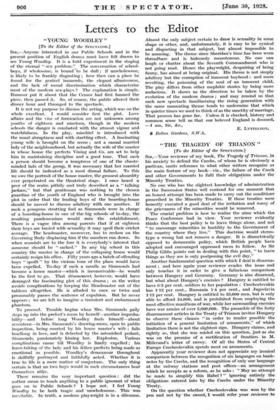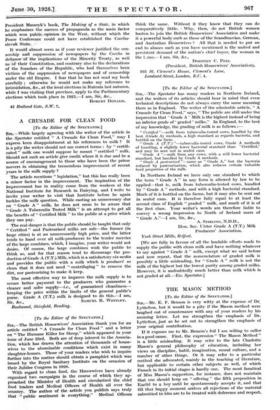" THE TRAGEDY OF TRIANON '
• [To the Editor of the SPECTATOR.] SIR,—Your reviewer of my book, The Tragedy of Trianon, in his anxiety to defend the Czechs, of whom he is obviously a partan, omits reference to what other writers recognize as the main feature of my book—viz., the failure of the Czech and other Governments to fufil their obligations under the Minority Treaties.
No one who has the slightest knowledge of administration in the Succession States will contend for one moment that an honest attempt has been made to carry out the conditions prescribed in the Minority Treaties. If these treaties were honestly executed a good deal of the irritation and many of the grievances of the minorities would be removed.
'The crucial problem is how to Milize the aims which the Peace Conference had in view. Your reviewer evidently thinks that the best policy is to leave things alone, and not " to encourage minorities in hostility to the Government of the country where they live." This doctrine would stereo- type a wrong but not remove a danger. It is diametrically opposed to democratic policy, which British people have adopted and encouraged oppressed races to follow. As Sir Philip Gibbs points out in dealing with this point, " to leave things as they are is only postponing the evil day."
Another fundamental question with which I deal is disarma- ment ; and here again your reviewer evades the issue and only touches it in order to give a fallacious comparison between Hungary and Germany. Germany is also disarmed, but what about Hungary's enemies ? Hungary is entitled to have 0.3 per cent. soldiers to her population : Czechoslovakia has 1.12 per cent., Rumania 1.4 per cent., and Jugoslavia 1.15 per cent. Hungary is entitled to 35,000 men, but is only able to afford 24,000, and is prohibited from employing the most effective munitions of war, while her surrounding enemies have war armies of over 5,000,000. The preamble of the forty disarmament articles in the Treaty of Trianon invites Hungary to observe these clauses " in order to render possible the initiation of a general limitation of armaments," of which limitation there is not the slightest sign. Hungary claims, and rightly so, that she was misled on this question, just as she was on the promise of a rectification of frontiers in M. Millerand's letter of envoy. Of all the States of Central Europe Czechoslovakia spends most on armaments.
Apparently 'your reviewer does not appreciate my ironical comparison between the recognition of six languages on bank- notes by the Czechs, and the recognition of only one language at the railway stations and post offices—an arrangement which he accepts as a reform, as he asks : " May no attempt be made to simplify this Babel ? " ignoring entirely the obligations entered into by the' Czechs under the Minority
Treaty. .
On the question whether Czechoslovakia was won by the pen and not by- the sword, I --would refer your reviewer to President Masaryk's book, The Making of a State, in which be emphasizes the success of propaganda as the main factor which won public. opinion in the West, without which the Peace Conference could not have established the Czecho- slovak State..- It would almost seem as if your reviewer justified the cen- sorship and suppression of newspapers by the Czechs in defiance- of the implications of the Minority Treaty, as well as of- their Constitution, and contrary also to the declarations of the founders of the Republic, who had themselves been victims of the suppression of newspapers and of censorship under the old Empire. I fear that he has not read my book carefully ; otherwise he would not make my reference to intimidation, &c., at the local elections in Rutenia last autumn, while I was visiting that province, apply to the Parliamentary elections which took place in 1925.—I am, Sir, &c.,
ROBERT DONALD.
41 Rutland Gate, S.W. 7.









































 Previous page
Previous page